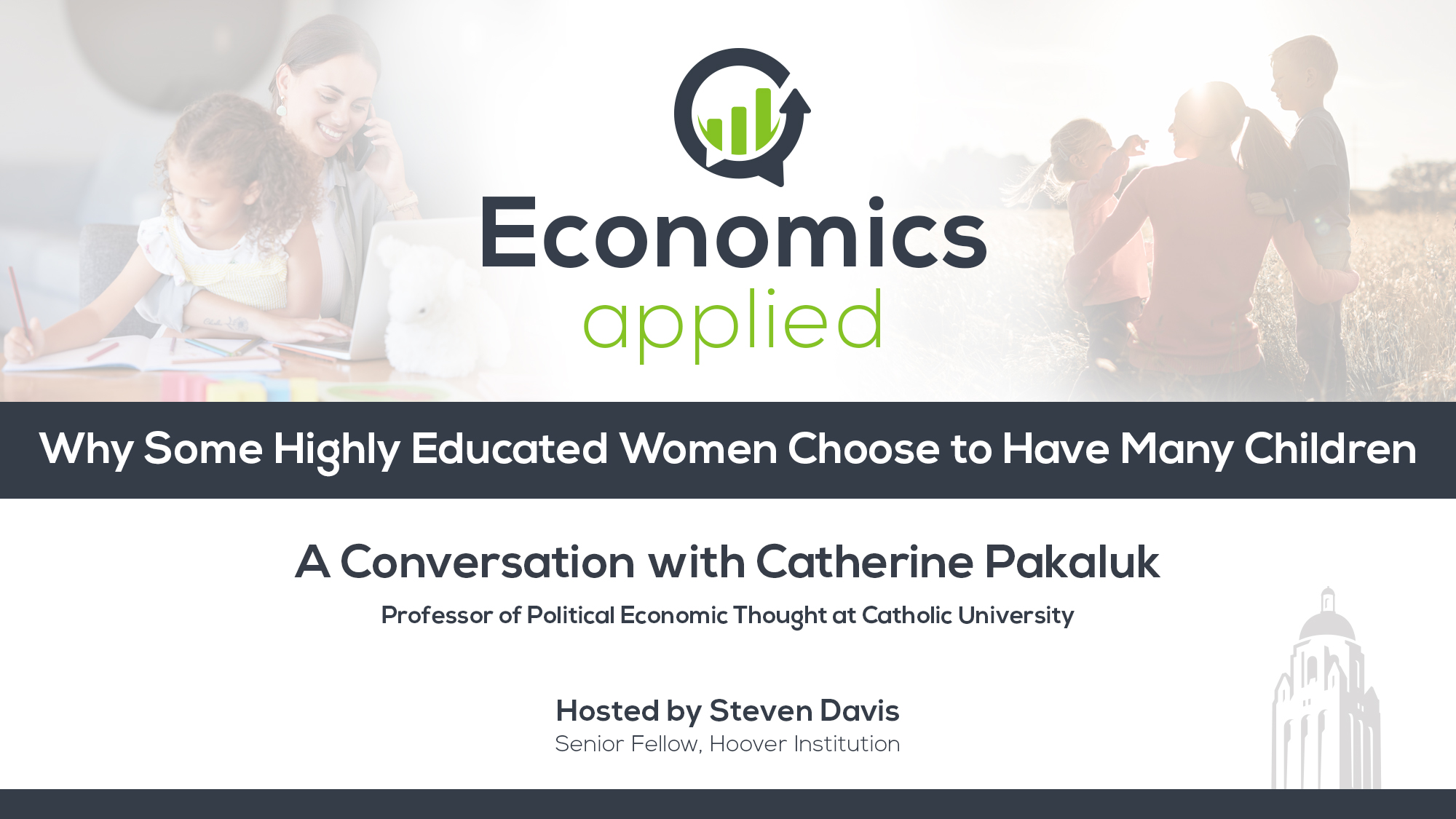- Economics
- US Labor Market
- Answering Challenges to Advanced Economies
- Understanding the Effects of Technology on Economics and Governance
Steven Davis speaks to Catherine Pakaluk, author of an audacious book on highly educated American women who choose to have many children. How do these women explain and understand their choices to have large families? What do their stories say about the broader forces that influence fertility decisions? What are the lessons for families and communities?
- Some highly educated American women choose to have many children, 5, 6, 7, or even more. How do these women explain and understand their choices to have such large families? What did their stories tell us about the broader forces that influence fertility decisions and what are the implications of large families for individuals and communities? Welcome to Economics. Applied a Hoover Institution podcast. Our guest today is Katherine lic. She's Director of Political Economy, an associate professor of political economic thought at Catholic University. She holds a BA in economics and Mathematics from the University of Pennsylvania and a master's degree in a PhD in economics from Harvard. Welcome Catherine.
- Thanks, Steve.
- So you recently offered a book titled Hannah's Children. The title alludes to the Biblical Hannah, who prayed to God for a child and was eventually blessed with six of them. So your book grabbed my attention for several reasons. First, I'm intrigued by its focus on women who make very different life choices than most of their peers. In one sense, your book is about outliers.
- Yeah.
- But not the sort that garners approval in popular culture or for that matter, in most professional and university circles second. And here I'm speaking as a professional economist. You earned a PhD in economics at a top university. But your research approach is highly atypical for an economist in this respect. Your book and its approach are also outliers, at least among professional economists. Third, the views espoused by your subjects and by you as the author for a striking and thought provoking contrast, prevailing views and social norms about fertility and family size. So all those things kinda really made your book stand out for me, and I'm, I'm delighted to have the opportunity to chat with you about some key themes in your book.
- Great. Likewise.
- So may maybe to start, you can just tell us a bit about your own life and family choices, at least as they relate to the subject of your book. 'cause they do so go ahead.
- Sure. Yeah. I, I, I tackled that right away in the first chapter. Yeah. In a sense, you know, I think sometimes research is about noticing things, right. And what we notice. And I, I chose to have a lot of children. So, you know, when I started out graduate school, I met my husband in the, the end of the first year of graduate school. And we, we had our first, we had our first baby. I mean, maybe at the end of my second year of graduate school, thereabouts around the time I was taking comprehensive exams. And I just really enjoyed him so much. Found him really interesting and fascinating. I felt a little bit like maybe motherhood had been undersold. I think I, I used that language in the book. My, my graduate work. I had six children, which, you know, that was an unusual number of children to have.
- And that's putting it mildly.
- Putting it mildly. Yeah. It's an unusual number. I'm not con I I may have been, it may have been a record, although I wasn't interested in records, so nobody looked it up. But Harvard has a, a fun tradition where when you, when you walk for your diploma, your, your kids can come with you. So that was kind of a fun moment. So of the econ faculty were there, these little people
- Are trailing along. Did they all come with
- You? Yeah, they did all come along. They all walked across the stage with me, which is pretty fun. Yeah. But you know, back to your question, I, I had done about, you know, a third of my dissertation work on kind of questions. You know, basically extending Becker's model of fertility, trying to see if it, if it could accommodate some, like a model of marriage and other, other ways of thinking about the contraceptive revolution. And then as we headed past the Great recession, and economists started to worry about, well, we're not really seeing the rebound, we were hoping to see, I started to wonder, you know, so it's a question I'm noticing, I'm thinking to myself, well, there's a lot of outliers here, and is it possible that the outliers will tell us something about the trend? And that was really the initial impulse. So yeah. So I would say I, you know, I think anybody could have done this research besides me, but because I had children, it seemed something I noticed.
- You're being too modest. I mean, as I mentioned before, your, your research approach is not typical of an economist. That's true. But economic thinking intrudes on the discussion.
- Yes. - Throughout, throughout the, throughout the book. So you're quite, you're quite knowledgeable about the literature, the economics literature on fertility. Yeah. You mentioned Gary Becker's seminal work on the subject, which is really central to the way most economists
- Right.
- Approach. So you have that knowledge.
- Yeah.
- You're also well aware of, you know, prevailing empirical approaches in economics. And that's not what you do. Yes.
- No, it's not.
- So you tell us about how you approach the subject.
- I will tell you. Yeah. Yeah. I felt I needed to make a little bit of an apology for that in the first, first chapter. I didn't mean that in a classical sense, in a kind of an alogia, a defense, not a not really asking for forgiveness.
- Right.
- Yeah. You know, I think I'll, I'll, I'll, I'll maybe mention a couple of different things. One is that I had worked, worked in and admired lots of research and applied micro topics, education, family labor. I mean, certainly, you know, the, the labor, the labor research at, at Harvard at the time was, was, was really strong and admired. Lots of it. But I also was starting to see a kind of, maybe a lack of dynamism in some of those areas of research. And almost as a sense as that maybe this has played itself out. What else is there to look at? And, you know, so you're sort of scratching your head and you're thinking, well, what, what else is there? So then you kind of have this question of theory. And so, you know, so for me it was a kind of confluence of a bunch of things. One is, you know, there's a lot of things we can test. You know, we, we, we need to continue testing things, but what are we, how are we refining our theories? And so I had years ago, years before maybe like 2003 or five, I think I had come across this study of non-marital births in the inner cities written by Maria Als and Catherine Eden. And, you know, it, it was, and one of them had been at, at the Kennedy School at the time. And so I had read this book and I thought, wow, like look at, look at the depth you can get out of interviewing people. And, you know, they had basically moved into inner city Philadelphia and spent a lot of time interviewing in their words, people, women who put motherhood before marriage. And so I just put a pin in it. I thought, this is fan fantastically interesting stuff. And I watched the policy conversation around the question really shift. And that just, it stayed with me. I thought, well, you know, it's not what we're trained to do and I don't really know how you do that kind of work, but you know, it, it stayed with me. You know, there's, so I, when I think about like most of Applied Micro when I was coming up in the field and being trained, you know, we really just mostly thought about refining our causal, our causal inference stories. And that's been great. You know, it's a huge, you know, kind of set of progress. But at the end of the day, you have another approach. Like when you have things you can't get a good causal story on, you know, in the quantitative, like you can tell a better story about it, right? So if you've got a correlation that's robust, you say, this correlation keeps surfacing. If you can't get a good causal read on it, you can tell a better story. And so that kept, I kept thinking, okay, well look, we know there are some very strong, robust correlations about fertility and birth rates. They're out there, we all know them, right? We know that education is inversely correlated with birth rates. We know that religious practice is positively correlated with birth rates, but what we don't really have is a great story about what's going on. So, you know, all of these pieces kind of came together. And I thought, well, maybe if I just went out and talked to people, you know, and I sort of basically argued, look, I mean, this may be the way the field does economics today. This isn't exactly like doing economic research, but I said, I said, I think it's an economic exercise to go and sort of investigate the trade-offs that people are making. Like, what do they think is going on? And then the way I've settled on trying to explain it is like, we need to t disentangle whether falling birth rates are really a sort of a supply problem or a demand problem. And I found that the stories were very compelling for helping to think through that.
- Okay. So you are motivated. Yeah. At least in part to explain the really spectacular
- Yeah.
- Striking trends in fertility around much of the world we see around most of the world. Right. We see in recent decades, and I agree with your assessment, we, we as economists don't have a great explanation, great understanding of that.
- Yeah.
- But I wanna give my assessment of what makes your approach distinctive. 'cause okay. You can tell me if, if you agree. So first you're just gonna ask people not, and not in a survey, but at length, you're gonna talk to them for two or three hours
- That's right.
- About something that is deeply personal and try to recover their own thinking faithfully and, and kind of loosely structured conversations. Yeah. So that's, there's, there's some of that in other areas of social science, but that's pretty unusual.
- That's right.
- To say. It's not unheard of in economics, but it's pretty
- Unusual. Right.
- Second thing you're doing, which is, you know, not, which is also outside of 98% of economics, is you're trying to understand where people's preferences come from
- Yeah.
- Other than taking them as given in the analysis. And moreover, you're actually trying to understand what shifts their preferences
- Yeah.
- In a personal way. So yeah, there's not very much research like that in economics. Okay. So that's the second thing.
- Yeah.
- The third, the third thing you're doing. And, and, and this, so I, I kind of fully applaud the first two. The third, I just wanna point out, it, it has strengths and weaknesses. And that is you're selecting on the outcome variable of
- Interest
- Forming your sample
- Yep.
- And that that can lead you Yeah. That, that we need to approach with caution. Yep. I understand why you did it, but it can lead to a somewhat distorted perception of what's really going out there
- Yeah. In
- The population as a whole.
- Yep. - So in all three of those respects, you've kind of violated what you were taught in your, your applied micro courses in your, in your theoretical courses at Harvard. That's true. So, so I just wanna That's true. I just wanna take note of that and, and hats off really for
- Yeah.
- It's really an audacious approach.
- That's right.
- So,
- Well, I figured it was a risk, it seemed like a risk worth taking, and I thought, well, you know, if five people read it, I'll move on, write some more papers afterwards. But, but no, I think the fruits have been, have been, have been apparent and yeah. The limitations, notwithstanding they're there, they're, they're clear, but there's, it's, it's opened up so many great things we can do next and we can research next and
- Yeah. Okay. So te so just tell us a little bit more about
- Yeah.
- How you, how you little on the technical stuff for a minute. Yeah. But how did you put together your sample and how did you go about then the research itself? A little bit on that? Sure, sure. And then we can get into what you, what you, what you learned.
- Yeah. Well, I, I kind of got all the books and, and tried to self-teach how to, you know, how do sociologists mostly do this? Benefited from, you know, reading a lot of lecture notes, lecture notes out of, out of the University of Chicago. It's just great work in this area. Anyway, what you do is you just like, what you think, you sort of go like, well, where are families located? We picked cities, we picked about 10 regions in the country. And we went into those cities and we said, okay, what, where are places where families might hang out? We knew like our target population, we were searching for women who are college educated, particularly just to look, we knew you couldn't, we couldn't, couldn't interview anybody, everybody. We had limited resources. And that's, you know, this education and fertility is where the real squeeze is. We figured, let's go talk to those people. And we just looked at where a family is hanging out. So you kind of, you hit your, you, you find a contact at a university, say, or a large church in a city. You say, Hey, this is the kind of person I'm looking for. Could you share this? You've got a flyer. You invite interested people who see the flyer to take a screening survey. This particular study, we had about 600 people apply across 10, 10 areas, or 10, 10 regions. And so in each city, again, this would be posted in churches and like YMCAs and other places people might see it. Then we get these screening surveys and the, the surveys are designed to help us kind of pick a balanced sample. And so for all the, you know, the econ quants listening, you know Yeah. This is, this is like totally not a representative sample in any normal sense. Right, right. Sometimes people say convenient sample, it's not, it's better than a convenience
- Sample. Yeah. It's better than, yeah. You've, you've sampled across cities, but just in these, in these flyers where you're trying to recruit potential interviewees
- Yeah.
- Did they communicate that, that you are someone who has a large family and that, and the average American would say six or eight children?
- Yes, that's right.
- Okay. So it's important to understand
- That interest. And interestingly, we don't have a good large representative sample of, of families with kind of above average numbers of children. No one's over sampled that we'll say. So that's what you'd want. If you wanted to go out and study this, you'd want an over sample. Right. No one's done it. I think this might be done soon. You know, this is like, because it's become such an interesting issue for people.
- Right.
- Yeah. That's, that's exactly right.
- Okay.
- So yeah. So it's a pretty privileged group of people. Nevertheless, we looked for people, particularly who were low income. We had some interviewees who'd been on food stamps at different points in time, and we had some that were fantastically wealthy and a bunch of super middle class people.
- Okay.
- Yeah. And so you, you know, you go in and, you know, like, okay, you're, you know, you just say nice things about their kids and you know, so usually at that point, I mean, sometimes they would ask, but usually at that point you kind of say, well, you know, I know what it's like or whatever that is. Right. You know, you just try to establish rapport and that's a good thing.
- Yep. Yep. Okay. Alright. So, so what, what did you, what did you learn from your extended conversations with these women about why they And they're husbands? Yeah. The husbands are in the background here. Yeah. But they're not completely passive players. That's right. Why they chose to have large families. What, what did you learn?
- Yeah, so like, before diving into the ways people could get there, I mean, I, I learned that really these are people who ready to, you know, sort of rearrange like a lot of other life goals in order to have these children. And that struck me as, as super different from at least the, the narratives I was already familiar with. So, broadly speaking, painting with a broad brush stroke people who had typically religiously motivated or, or experiential reasons to say like, this is really important. This is top of my list, important I'd, I would, I would count my life as having been a, a big disappointment if I didn't have these children. So really a story, you know, really what he would say, like high demand for children. And that was interesting. Now, how did they get there? Well, kind of, there were two ways, you know, basically there were the, there were the always wanted kids, people
- Who
- Had some kind of life experience that contributed to that. I tried to profile for you a couple of the ways that happens. One typical way, which I think people would guess, is that some people grew up in big families. And so they thought, well, this was really great. I loved having, to your earlier point, I expect if I went out and did a completely similar study with people, with, with few children or, or no children, some of them would, would look similar. They would say, well, I grew up in a large family and I didn't love it. So that would be something worth doing later. But, so that was one way it happened. And then another way it could happen is some, some people said, well, you know, I grew up with no siblings and it was very lonely. And, you know, there was a like a, like a family on the block and there was like kids always in the house. And, and I just thought, that's what I want. And then the other way, which which is, which was really interesting were these kind of profound, like religious conversions. And this happens to people is a lot of religious traditions are not agnostic about having children. So, you know, had like Jewish converts and, and sort of evangelical Christian converts and Catholic converts who at some stage in their adult life had encountered a religious tradition in a particular community. Like literally, you know, I went to Israel to find myself, I met a charismatic rabbi who said, you know, this is the meaning of life. And I thought, yeah, I buy that. I'm gonna do this. And so, so those religious conversions are very interesting.
- When you, when you say conversion here, do, do you always mean literally a conversion or you just mean somebody who might have been casually religious and now they've, it's it's affected their life in a different way.
- Yeah.
- Is that, is that what I'm just trying to understand what you mean by conversion.
- Yeah. So I, I guess I both types.
- Okay.
- But I mean, like a religious experience.
- Okay. - That may have been a change of religious belief or a refinement. So certainly the Jewish case that I tell at the beginning, she, she was ethnically Jewish, grew up Jewish, but grew up sort of really super secular and didn't have a Jewish lifestyle. And I am using her language, she said, and now I've chosen an intentionally Jewish lifestyle. So, you know, I don't, I don't know a lot about the different ways you can be Jewish, but
- Okay.
- Yeah.
- Alright. And you, you also talk about people, women, and sometimes their husbands are
- Yeah.
- Intimately involved in the same kind of transition process who
- Yeah.
- Weren't sure if they wanted many kids, but they had one or two. And it was such a profound, it profoundly affected their desire to have more.
- Yes, exactly. So I kind of distinguished between how it started and how it's going and in that sense, this kind of colloquialism. But yeah, this was a, this was a big reason for some people to keep going. They had that first kid, I mean, this was, you know, I had a lot of reasons to keep going, but the, this was a huge piece of my experience was this is, this is so much more enjoyable than I expected. You know, one lady said, well, we just fell in love with babies. You know, that's, that's an interesting thing. You know, and then you have to ask all kinds of other questions like what, you know, you're living in an environment where you're not really socially normed that much. I mean, the woman who said we fell in love with babies. I mean, they live, they, they have their own personal church in the Rocky Mountains. And, you know, you know, when I say their own personal church, I mean, there's a church of about 15 members. And so in, in other words, like there, there's, there's no social norming that says, well, you fell in love with babies. But sure. Like, we all love babies, but you know, it's like not reasonable to go past two. So of course there's other factors here, but in terms of that preference formation, it was very clear that the a a positive experience with having the first couple of babies was a big motivator for, for some people. And, and stepping back and looking at the, the broader literature on demographics, one of the things people today think is affecting the birth rates is that people are transitioning to parenthood so late in their reproductive cycle that if they discover late in their thirties, gosh, I really love babies, it may be too late to have a second or a third. So I think it's worth highlighting the importance of Yeah, I agree. That possibility. This
- Is the, this is the key issue.
- Yeah. - I mean your, I'm, I'm sympathetic to the view because I've seen it in my own
- Yeah.
- Social circles and family, that for some women, the experience and some, and the, and the, some families, the experience having one or two children profoundly alters their view about the desirability of additional children.
- Right.
- And as you say, if you have your first child at age 37
- Yeah.
- And you suddenly decide you want four. Yeah, yeah. That's not very likely to come about. So
- Right.
- There are potentially important implications Yeah. Of the timing of fertility right. Over the lifecycle for how many, whether people actually end up having the number of children that they desire. And I think you cite this research, which, which finds that, you know, first it's well established that, that yeah, there's on average a gap,
- Right?
- You ask 40-year-old women, how many children did, did you want? And how many do they eventually have? On average, they have less than they wanted. And that's especially true for women who started later.
- Yeah. - So there really is, it's a, again, this is outside the scope of what economists usually think about.
- Right.
- But there's a certain departure from rational expectations
- Here. Yeah, that's
- Right. Which, which is interesting to note.
- Yeah. Yeah, that's right. I mean, I, I present the data on the fertility gap. I think it's important, it's a big piece of this whole conversation about birth rates. I try not to take a dogmatic position about it in the book, because I don't have a dogmatic position about it. I mean, if you're an economist and you, you propose, I mean, I, I think a, a classically trained economist, if you say, well, you know, I've discovered there's a gap between what people, you know, kind of hope to have and what they actually have. I would say, you know, tell me something new. If you ask people how much income they would like to have, there's an income gap. How many cars they would like, I mean, in other words, like, this is the whole thing we're discussing in economics is that we can't have everything we have, there are trade-offs and budget constraints, and the world offers constraints. So I'm on the one hand, you know, it's a, it's like worth discussing. On the other hand, there's a, there's a task to be done. I mean, one of the first, one of the first papers to point out the fertility gap to, to my knowledge was golden and katz's power of the pill. And it's, I think it's just a footnote in there. And Claudia says, what I think a lot of us would like, my first pass would be, this is a trade off. I mean, so, you know, if you, or if you flip the question around if, if women are choosing between career and children, is there a career gap?
- Yeah.
- Probably. You know, probably very,
- I I I, I don't think that's all of it. I mean
- No, I agree
- With you. 'cause you can, if you ask people about intentions
- Yep.
- Rather than wants
- Yeah. It's
- Harder. It's hard. You need a longitudinal study of intentions
- And realizations. Yes, exactly. Exactly.
- But I think I agree with you would find is that there's a gap between intentions expressed, say at age 20
- Yes.
- And realizations at age 40.
- Yes.
- And that, that's not so easily explained by just the trade off. And we all want more of everything. That's good. But of course we have to make choice.
- Yeah, no, that's right. That's right. I, I pointed out, because typically it's, it's treated, it's treated like as prima facie evidence that there's some kind of way that if we, if we, if we sent, you know, bigger stipends to people, they would end up having more kids. And I think that doesn't follow. Right. So, yeah.
- So, you know, you, you mentioned the role of religion and religious beliefs already. It comes through quite clearly in your
- Yeah.
- In your conversations with these women. But there's also, at least this is my reading, you can tell me if you disagree. There's, there's various pieces of evidence in there that it's, it's almost broader than religion.
- Yeah. - There's one woman who has this very nice phrase. She, she wants to be part of the chain of infinity.
- Yeah.
- Which is really, she sees the process of motherhood, childbearing is connecting her to the whole stream of humanity looking backwards in the past and forward into the future. That's sort of, it's almost a mystic Yeah. Rather than religious view. Yeah, that's right. And then there's other women who will explicitly talk about, and they may be religious themselves, but they say things like, this is almost underneath religion.
- Yes.
- Or pre religious. So yes. I, I at least read your, your, your interviews as saying, in the United States context, at least, this kind of desire and to have children and feel like you're part of something bigger than yourself most often manifests itself in religious ways, or it's tied up to religious beliefs. But it is really something broader than that.
- Yeah. Do
- You agree with that assessment of your
- I do. I deeply agree with that assessment, which is one of the reasons I, I struggled to find words for this. This is why I end up with this like, funny title, Hannah, the Biblical, Hannah. 'cause it's more like there's an archetype or kind of orientation to something that we might say is like anthropological or a view of what it means to be human or something like that. If it was doctrinal, then we would find it would differ across these religions. But what I found is that I thought the expressions that these, I mean, how do you explain, you've got women in, you know, Jewish women in the middle of the country and even women at the, in the coast, and they don't even read the same stuff. So, so yeah, I definitely struggled. It's definitely, this thing is not unique to any particular religion as far as I can see. And but as you say, at least as far as we can see in the United States, it's typically sort of supported or nourished in religious traditions that affirm the value of having children. But what they're after is something that's maybe human or
- Yeah,
- Yeah. Anthropological. Yeah.
- Right. And, and, and here as in many other aspects of human beings.
- Yeah. - Yes. The intensity of this manifests itself very differently across people. Yes. Right. And some, for some people, this, this really isn't maybe a consideration at all, but, but it did come through clearly in in your sample of interviewees.
- Yeah.
- And just, I don't think we said it yet. These, everyone in your sample has at least five children. Is that right? That's, and and there's a good number who have eight or more.
- Yeah. The, the average was seven.
- Seven.
- Okay. And actually, it's funny, in inside the sample you see the, the trade off with career. Actually, it's interesting 'cause my, of course I set the lower bound at five, that's arbitrary. Could have been four, could have been three. But I set the lower bound at five. And inside my sample, the ones with, you know, eight or 10, you know, they were full-time moms. And the ones with five or six were oftentimes working like I am. Right. Right. So,
- Right. So, okay. So what, what, what do you think these stories and explanations tell us about the broader cultural and soc social forces
- Yeah.
- That influence fertility decisions. We, we've touched on that already, but
- Yeah.
- What, what, what are the main lessons you, you would want to convey in that respect?
- Yeah, so I've spent a lot of time, I, I maybe I've spent a few pages on it in the book and probably not enough time. And was, we know trying to teach anything economic, it's like not easy. You know, we start try to, you think when they hand you econ 1 0 1, you think, oh, this is gonna be a cinch. And then you start teaching it, you're like, what? Like, I don't, how do I derive a demand curve again? That's not actually so easy. So it's taken me now a couple of, a couple of, I would say months I've been really trying to figure out how to refine this demand story. So the, the kind of economic lesson I took away is to really think harder about demand. And so, okay. Meaning, okay, these are people who really want their kids. They're, they, these weren't ki these weren't people who, like, there was plenty of room. They could have said, well, I had easy pregnancies. Just, just pop 'em out. No big deal. You know, these are people who, the driving story was demand. And in fact, they all articulated nicely, like all of the personal costs. And so, you know, we could, you know, it's like I'm trying to carve this up in a way that makes sense. So I thought, well, this is interesting. We've just been treated to these multiple stories of what it looks like to really want kids. And that made me start to ask the question of like, well, have people always wanted kids? And what is the demand story going back? And I thought, well, you know, remember that old thing we used to like read in seventh grade that like, well, in the old days people had kids 'cause they were really useful on the farm. And I thought, okay, that's interesting. We can work with that. So I kind of worked through. And so I think the way I've liked to present this now to, to audiences when I talk about it, is that the demand for children has basically collapsed. And you can kind of trace that in lots of different ways. And I, you know, when I say that I do mean the economic demand for children. Children were domestic help and labor. It doesn't mean that's the only reason people had them. We'll set that aside for a minute. But they just were, they functioned that way in a, in a poor society, look all hands on deck. Right? You're like, Hey, you're ready to make cheese, you're making cheese. You know, so domestic health and labor, and that's really machines and it's economic growth, and that's a good story. Don't need as many surviving children. And then you had pensions and old age support children really did serve an economic function for the household. And so then thinking about the locus of demand, like it's the household that has to choose this, you see that collapse. And then finally, birth controls are really a really strong contributor to collapse in demand. What I mean there is just now, you know, I presented in the book this quote from some demographers that I think are, it's really stunning when they say, look, like in the old days, you know, basically you got married and you have, you start having kids 'cause that's what happened. And they say, well, when you get really effective birth control, what you have next is you, you separate the demand for marriage, which is pretty robust over time. And the demand for children, like, in other words, they are two separate rational decisions to make. And so what they said was the key decision from a demographic perspective used to be when to stop having children. You got married, you had some kids, and at some point you said, all right, we gotta do something about this. Maybe we don't want a fourth kid or a third kid. And there were always things people did, and we, we can think about all those things. And they said, but the new decision isn't when to stop. It's when to start.
- Yeah. And that ties back to somewhere earlier
- Yeah.
- Discussions about children as an experience. Good.
- And exactly
- The
- Relationship, precisely
- Intention.
- So as soon as you make that decision separate, now it's a qualitative decision. It's a decision that's like, when's the right amount, when's the right time, when's the, all those things. So this is a, this is a whole piece of this demand story. So I think you could have economic growth and you could have pensions and savings, but if you didn't have the really effective birth control, you'd still have like an earlier transition to parenthood. So this is this demand story.
- Okay. Of the three elements to the demand story that you described.
- Yeah. - The one that strikes me as the least important, least persuasive in a global context is the one about pension. Because
- Yeah, - The fertility ca collapses happened in almost every country, not just the ones that have well-developed social insurance programs.
- Yeah. That's,
- Whereas the other two phenomena you described, really, they really are global
- Phenomena. They are global.
- So, so I guess I think of the
- Yeah.
- Children as, as the way I say for my old age seems like, yeah, yeah. I understand the economics of that. It makes sure perfect economic sense, but it just doesn't seem to be the operative force in much of the world.
- It, it certainly doesn't explain, or it's not like it Yeah. It's, it's, it doesn't explain a significant portion of the variation of the last 50 years of, of collapse of birth yet. For sure. I agree with that.
- Okay. So collapse in demand
- And
- Well, let's, let's,
- There's more to that. Yeah. Yeah.
- Let's ju there's more to that. But, but maybe you wanna say something about, well is, is there, how should we respond to that as a, as a society? And if so, how?
- Yeah, yeah. Well, I don't think it's possible to respond to the, the the two pieces that, that you find compelling, right? Like the economic growth. I mean, we're just, we're just very wealthy. That's, that's, that's good news. We don't wanna, but listen, I mean, I I it's worth saying that you do hear, oh, and by the way, let me, let me go back. Collapse in demand, and then there's this opportunity cost story. So there's a cost that increases, but it's not the cost of having kids, it's the cost. It's the opportunity. Opportunity. Okay. So we, we all know that story.
- And just for our non-economist listening Mm. You're referring to women's opportunities in the market sector to earn wages Yeah. To pursue rewarding professional careers and the like.
- Right, right. Right. Yeah. So I don't think we, it's, I was gonna say part of the job right now of sort of explaining this work is responding to some of the stuff you hear out there. I have heard people say and credible, like, adults say, maybe it would be good for us if we became more poor, or we embraced a program of degrowth thing because if we got more poor, we would want more kids again. And you're like, okay. Like, right. So to me that's, i i, that that's not sort of something we could respond to in that way. I don't think we should wanna do that. The the other, I mean, I, we're not gonna put the genie back in the box on birth control. I don't think that's something we're gonna go back on and shouldn't, it's a good thing we know how to decide when to have children and when not to have children. So, so then a then a question arises like, can you, can you incentivize demand through some, you know, policy program? Because that, 'cause then what do you, that's all that you've got left, right? You can't reverse these, I guess we could call them technological changes. Certainly the birth control is a shock. You know, economic growth is a series of things and that's what's, but I think this is what, for me, this is a very compelling way to understand the reason why these financial incentives have not worked. So as a society, the the standard approach is let's do some kinds of, you know, subsidizing of childbearing in order to kind of stimulate demand. Okay. That's our normal approach. The question is, well, it hasn't really worked well.
- So two, two things on that. Yeah. First, in, in here you're, I I agree with your, your assessment, we, there's a pretty large literature now looking at many countries. Yep. It finds the, the, the size of economic, the financial incentives you need to actually move fertility even a tiny bit are huge.
- Right.
- A million dollars or more
- Correct.
- Per kid. So that, that's not an effective strategy.
- No. - And I, so we have lots of evidence on that now. Yeah. And so, yeah. But I think, I think what's, what's a little bit less clear is whether there are changes in institutional arrangements, which are partly influenced by
- Policy. Yeah.
- That can have a po an impact on fertility choices and even, and also on the timing of fertility choices
- Yes.
- Over the life cycle. And that in turn for the reasons we talked about earlier. Correct. Something that facilitates earlier fertility
- Yep.
- Earlier in the life cycle can have not just the immediate effects, but knock on effects for those women, those families that say, Hey, this is better than I expected. I want to have more kids.
- Yep.
- So, you know, I'm, I'm actually, I'm gonna send you a paper after we talk. Yeah. But I, great. I have a new paper with Nick Bloom and others that is looking at the relationship between the ability to work from home and the both the number of children since the pandemic. Yep.
- Yep. - And the desire for more children in the future. This is a, this is a correlational study at this point,
- But Yeah.
- But what we see in our US sample and in our 38 country sample around the world is observationally similar people
- Where - At least one of the household partners has the opportunity to work from home some of the time.
- Right. - Have more children than those who don't have, and the couples that in which both partners have the opportunity to work from home at least one day a week, have more yet.
- Yeah.
- So that, that is suggestive that the
- Yes.
- Flexibility that comes with the ability to be at home one or two days a week does affect. And, and we find, you know, non true, these are not small. Yeah. And they're certainly the, the, you know, like, just to give you a bottom line number. Okay. If we go from couples, and these are couples that have neither party, neither partner has the opportunity to work from home one or more days a week to both partners do
- Okay.
- Get an increase in lifetime fertility estimated of about 0.25 children per woman.
- Yeah. That's not trivial. Yeah.
- That's not trivial. It's not gonna, not at all, it's not gonna push fertility back to replacement rates. No. But it's quite large compared to what these direct subsidy schemes find.
- Correct. Yeah. That's correct.
- So, so again, I think this is about making yes. Aspects of, of, of life that people can
- Right.
- Craft for themselves more conducive to raising children in a way that allows, you know, one or both partners to continue pursuing other activities
- Yeah.
- While still being present in the household.
- Right. No, I, I think this is really interesting and it's exactly the kind of thing I tend to try to describe for people. I mean this, this sort, so you can do two things. You've got this trade-off pinch, which we know is real, and it's there. So if you can alleviate the necessity of some of the trade-off, this is gonna help. The other thing is we discussed before is can we reduce the time before the, the educational pathway, especially for women? So we're doing a terrible thing, which is, you know, educational credentials have been inflated in all kinds of ways, lots of reasons for that. Right. But you know, what we're ha what we're seeing today is people are taking jobs in their late twenties or mid twenties that they took 30 years ago at 18, and they have more credentials today, but they're doing the same work. So that's, so that's clearly a problem if people are fertile in their twenties. Yes. So, so we need to sort of work on collapsing the, the, you know, making, making education more efficient.
- Okay. Yes. Okay. So I, I wanna switch to a Yeah. Different part of your book. So there's, there's quite a bit in your, in your book, both from your interview subjects and to some extent from you thoughts about how, I'm gonna call it the scarcity of babies in modern life for that's, for lack of a better term.
- Okay. - How that affects our lives, our communities, and the country as a whole. You wanna share some of the, and and how it affects individual personalities and
- Yeah.
- So what, what did you learn in that respect?
- Yeah, I can share some of this. I mean, I, I tried, tried to include this kind of at the end. I mean, it comes out in some of the stories. I, I moved it to the end 'cause it's material that's really suggestive. But some of it was the most powerful stuff that I encountered and I thought what was important to include it in there. And so I kind of separated into two categories. One is, one is things that affect the char, like the character of the nation. I say like, so our character or what it means, you know, how, how we live as people. And so I'll, I'll talk about that briefly first. And that is, you know, I, it is hard, it was hard for me as I was reading through my data for years. And I'm also reading things like, you know, Ezra Klein's, why we're Polarized and the 1619 project and all these various things that are kind of asking the question like, have we become worse people? And so I'm, I'm reading these things. I'm always interested in the interesting books about the, the character of the American public and state of politics. And meanwhile I'm reading this data and I'm finding that the moms are telling me, I guess the language one of the moms used, which I thought was, was nice. How surprised she was to discover that having lots of siblings was like a natural school of virtue for her children. And she said that what, what for her, the reason this was so strong, she was like a former corporate lawyer who'd given up her law degree at some point, or her law work at some point. But she had not intended to have so many children. It was kind of a process. And she said it was interesting because as she had grown up, the thought was, you know, you have fewer children so that you can give them more. And she said, well, what I'm seeing is that although, you know, there's some things they have less of, there's this tremendous gift of, of like, they learn to share things and they learn to be less self-centered and they learn to look out for younger siblings and they're learning all this stuff without a curriculum. I'm not teaching it to them. Not even role modeling it. So merely the funk, the sort of the presence of these other young people. Yeah. And they're learning
- How to deal with different personality
- Yeah. Different perspectives. That's right.
- The parents are learning this too. You talk about this, the parents learn it too. It's true. And you know, there's some li there's some discussion in the book.
- Yeah. And
- I think I've certainly experienced this as a parent, that you learn, you know, each child has their own personality and temperament.
- Yeah.
- And they're not, and you can only do so much with the nurture part. Yeah,
- That's
- Exactly right. It's a lot that's hardwired in.
- That's right. And so I just kept thought thinking, well, geez, I wonder how many of these things where we've asked these questions about the character of the country we're fighting or polarized. There's all these difficulties. Has anybody kind of like, you know, like proverbial speaking, run that regression where we think about where we think about the independent variables. Like how many siblings did you have? And I realize, well actually, like not that much. We haven't been thinking about this. And
- So here, I, correct me if I'm wrong, you're you're putting the question on the table. This is, you know, there's, this is not an easy question to resolve.
- That's right.
- That's
- Right.
- And, and it is, it is a radical departure from the quantity quality trade off that dominated fertility decisions. Because you're saying you're suggesting strongly at least that on some dimensions
- Yeah.
- There isn't a quality quantity trade off. It's that more is better.
- Yeah. - For at least the personal virtues that children and I this is within reason, you know, not these, these No, no. Not the people in your sample are not Yeah. These are not families that are suffering Mm. Food, you know, lack of food because they have too many kids. So.
- Correct.
- So it's conditional on
- Conditional on that.
- Yeah. On that.
- Yeah.
- But, okay, so, and yeah, but then, you know, it's hard to do full justice to what comes through in the book. But
- Yeah, - These virtues you talk about that are facilitated by large families, they spread out to the community.
- Yes.
- They, they affect how people, how people grew up in small, in large families
- Yeah.
- Are maybe better equipped to deal with a variety of people and to empathize also. And, and Right. The the empathy part comes through very clearly. Yeah. And so that affects just everyday civil
- Discourse
- Yeah.
- How people relate to one another. So there's, there is something worth thinking about here.
- There is something we're thinking about. Yeah. I just put on the table. The other maybe even more provocative thing to put on the table was this other idea that, that, you know, these kids weren't lonely. They have all these siblings around. I heard many stories, and again, this is, you know, it's obviously anecdotal. I don't like a large, a large trial in this many stories reporting either children or adults kind of being, I don't know, restored or kind of helped out of a, a low period of time, kind of a low, low period either suffering through grief or other things. And so that sort of hypothesis that's on the table is like maybe some of this anxious generation stuff, maybe some of this like rise in is people struggling with mental health disorders is related to the loss of what one mom called the sun lamp effect. She said holding a baby is like putting someone in a sun lamp. And I thought, well actually there's something to that. You know, there are places you can go and hold kittens and puppies. Like that's just what they do. And we all get that, you know, holding a puppy is really special. And then I started to think like, well, let's do the math on that. I think I did it in the book, like the back of the envelope calculation on, you know, if you, if you move from a three child world or norm to a a one child norm, you know, what percentage of your adult life do you spend around a baby? And it's pretty small, like a pretty small amount of your life. So I thought, again, this is something to put on the table. I went and did a quick search. You know, there's not, I, I couldn't find significant studies looking at whether there's a protective effect of having an older sibling, or sorry, of having a younger sibling on teenage mental health. So there's a whole host of questions. I hope pe people better prepared to research them than I am. We'll pick those up.
- Yeah. But I, the way I thought about that part of your a discussion in the book is it's having, being part of a large family, having babies in particular takes your, your inner focus away from yourself towards others.
- Yeah.
- And one, and, and for the mothers in your study in particular, you know, they, they find and achieve purpose
- Yeah.
- In their lives through motherhood. Right. And while that's not the only way to find purpose.
- No,
- I think there is something to the, if you don't feel some sense of purpose
- Yeah.
- It's very hard to be mentally, psychologically healthy. Right. And,
- And yeah.
- Not the only avenue, but one avenue is you're part of a large family, you think about your siblings. Right. Or you think about your children. That's, that's what I take to be your broader point about
- Yeah. That is the broader point. Yeah. Yeah. Yeah. And so these were powerful stories and I think they were worth, worth communicating and telling. And I'm, I'm hoping to do more research on them in the future.
- Okay, good. So, you know, I, there's many great lines in the book come from the mothers and one that's sort of related to this. I've, I've written it down here. Let me see if I can think about it. Somebody asked one of these mothers or the, the top the topic came up, well what about all the things your family has to forego the entertainment that you can't afford? And, and the mother's response was, well, we do activities that don't cost much money. Like going to the park and fighting with your siblings doesn't cost anything. I just thought that was a great
- Line. So funny. Funny. I know. So
- Funny. Yeah. You can just have convos with your siblings and resolve them and that's that's free.
- Yeah. That's
- Free. So, so and so anyway, there, there are a lot of great lines in the, in the book along those that we can't really do justice to. Anything, anything else you wanna put on the table here?
- Yeah, I suppose, you know, no, I think we've co we've covered a lot of it. I think, you know, besides those, you know, I think it's an interesting question. Like should society respond to this? I, I get often putting the camp with the ISTs. I'm fond of saying, I don't think I'm a prenatal list. I'm really interested in the question of why people choose to have kids and why they don't. I don't, I, I guess I wouldn't be comfortable with society kind of aiming at a higher birth rate anymore than I would be comfortable with society aiming at a lower birth rate. To me, these are things that kind of part of the unplanned order, so to speak, that we
- Right.
- But, but we should, we should be concerned if the institutional arrangements in society don't make it possible either on the one hand for people to progress through these kind of life cycle stages in a way that that opens up these possibilities for them. And that may be a simple matter of having first grafted women into a male educational pathway. And we can course correct on that. Another thing would just be like to question the information that people can have. 'cause one of the things that religious communities are doing well, some of these religious communities that I profiled is they're getting this kind of information to young women so that they have another, like it's somebody has said to them, Hey, have you, you know, this would be, this would be really purposeful. You'll enjoy this a lot. So I think there's a lot to be gained from sort of opening up avenues for that kind of information to get through to people. So Yeah.
- I, so there's the institutional side.
- Yeah.
- And you mentioned the role of religions getting information to people, but I, I guess I think it's more than that, which is there are large segments of our culture, including mainstream media
- Yeah.
- That often convey the message that children are a burden
- Yeah.
- Without convey, without really transmitting the other side of the story, which is Yeah. Yeah. They're, they're, they're a burden. They take all, you know, a lot of time and effort, emotional investment. They also are a tremendous source of fulfillment.
- Right. - So I, that that, that narrative is very much a part of the dominant conversation, at least as I've heard it in
- Recent. No, that's
- Very fair. In recent decades. And I gather you think, you know, well why do we wanna, why do we wanna make that the main narrative? Correct.
- Yeah. Oh, correct. I don't think so.
- It's beyond, it's, it's beyond institutional arrangements in the role of religious institutions. There's a cultural element to it.
- Yeah.
- Which I think has discouraged and frowned upon large families.
- Yeah. I think that's, I think that's legitimately true. And I, I would agree if I would affirm everything that you just said, but I would, I would add a little piece to that, which is I think a, a part of the blame for that cultural narrative as a kind of educational monoculture.
- Yeah.
- So I would see something like, you know, a a more robust system of school, school choice, or we education freedom. We're now calling it as being a big part of the solution.
- Yeah. Okay. Well I'm with you there.
- Yeah.
- For many reasons. Not including the one that's we just talked about. It's
- Right. For many other reasons.
- And, and, you know, let let a spontaneous order emerge Yes. Rather than impose it in a top down manner.
- Yeah, exactly.
- And that's, that's a, that's a good approach in many settings, including
- Yeah.
- How we educate our children.
- Right.
- So, you know, I wanna, I got my, I got my copy of your book here, I think. We'll, we'll, thank you. So one, one more point about your book as we sign off, what we haven't really done a good job of communicating just how much fun the book is to read. You know, it's not a heavy duty technical read. There are lots of great stories. I often smiled or chuckled or even laughed out loud as I was reading the book. So if you're an economist, and if you're not an economist, you can enjoy the book and profit from it if you aren't an, I wanna say two more things as I close here. One, if you are an economist, take a look and, and maybe you want to try some audacious approaches to your own research. And then if there are any f if there are any deep pocketed foundations out there that are sympathetic to your message, what I'd like to see, and I'm speaking now from a kind of a, a research scientist perspective, I'd like to see the same kind of interview style done at 20 times the scale. So that instead of just sampling, focusing on 5% of the population, you can focus on the
- Yeah.
- You know, really a reasonably represented sample of the full population of say women and get a fuller sense of
- Yes,
- You know, what is, what is affecting fertility outcomes, what are the consequences, at least within the family more broadly. I think that would be a very productive and useful thing to do.
- Yes, I think so. Well, if any of those deep pocketed foundations are listening, I'm, I'm here to contact, I'm here to say I'm definitely willing to do that study.
- Yes. That's, that's why I, I'm giving you an advertisement here and, and just let me know if anybody follows up.
- I will, I will. Yeah.
- Alright.
- Thanks Steve.
- It's, it's been great to chat with you, KA
- Yeah, you too.
- Okay, take care.
- You too.
- Bye-bye. Bye.
ABOUT THE SPEAKERS
Catherine Pakaluk is Director of Political Economy and Associate Professor of Political Economic Thought in the Busch School of Business at Catholic University. She holds a B.A. in Economics and Mathematics from the University of Pennsylvania and a Master’s degree and a PhD in Economics from Harvard University. She is the author of Hannah’s Children: The Women Quietly Defying the Birth Dearth, 2024.
- Check out Catherine Pakaluk's website
- Follow Catherine Pakaluk on X: @CRPakaluk
Steven Davis is the Thomas W. and Susan B. Ford Senior Fellow and Director of Research at the Hoover Institution and Senior Fellow at the Stanford Institute for Economic Policy Research (SIEPR). He is a research associate of the NBER, IZA research fellow, elected fellow of the Society of Labor Economists, and a consultant to the Federal Reserve Bank of Atlanta. He co-founded the Economic Policy Uncertainty project, the U.S. Survey of Working Arrangements and Attitudes, the Global Survey of Working Arrangements, the Survey of Business Uncertainty, and the Stock Market Jumps project. He also co-organizes the Asian Monetary Policy Forum, held annually in Singapore. Before joining Hoover, Davis was on the faculty at the University of Chicago Booth School of Business, serving as both distinguished service professor and deputy dean of the faculty.
RELATED SOURCES
- Hannah’s Children: The Women Quietly Defying the Birth Dearth by Catherine Ruth Pakaluk, 2024.
- An Economic Analysis of Fertility, Gary Becker, in Demographic and Economic Change in Developed Countries, 1960.
- Promises I Can Keep: Why Poor Women Put Motherhood Before Marriage, Kathryn Edin and Maria Kafalas, 2011.
- On the Interaction between the Quantity and Quality of Children, Gary Becker and H. Gregg Lewis, Journal of Political Economy, 1973.
- The Power of the Pill: Oral Contraceptives and Women’s Career and Marriage Decisions, Claudia Goldin and Lawrence F. Katz, Journal of Political Economy, 2002.
- Work from Home and Fertility, Asksoy, Barrero, Bloom, Cranney, Davis, Dolls and Zarate, working paper, August 2025. Slides.
ABOUT THE SERIES
Each episode of Economics, Applied, a video podcast series, features senior fellow Steven Davis in conversation with leaders and researchers about economic developments and their ramifications. The goal is to bring evidence and economic reasoning to the table, drawing lessons for individuals, organizations, and society. The podcast also aims to showcase the value of individual initiative, markets, the rule of law, and sound policy in fostering prosperity and security.
For more information, visit hoover.org/podcasts/economics-applied.



















